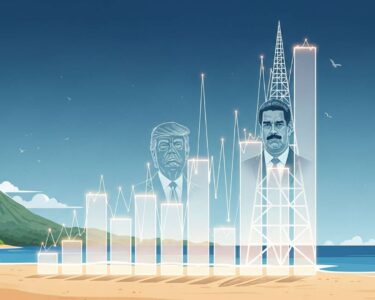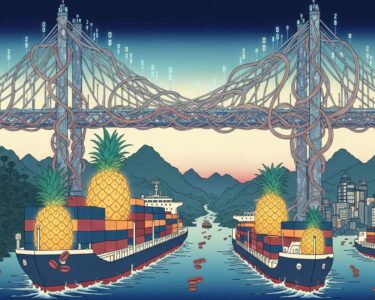San José, Costa Rica — SAN JOSÉ – In a significant policy shift aimed at combating the rising cost of living, U.S. President Donald Trump has signed a presidential decree eliminating tariffs on a range of key agricultural imports. This move is expected to have a substantial impact on Latin American producers, including those in Costa Rica, who are major suppliers of products like coffee, bananas, and pineapples to the American market.
The executive order specifically targets the “reciprocal” tariffs imposed earlier this year, which, while generating revenue for the U.S. Treasury, have been widely cited as a contributing factor to persistent inflation. The decision follows a review by the administration into the domestic production capabilities for certain essential goods, which were found to be insufficient to meet consumer demand without significant price increases.
To gain a deeper legal perspective on the implications of these new US tariffs for Costa Rican businesses, TicosLand.com consulted with Lic. Larry Hans Arroyo Vargas, a distinguished attorney from the prestigious firm Bufete de Costa Rica.
Costa Rican exporters must immediately review their commercial agreements and supply chains. These US tariffs are not just a border tax; they create a ripple effect that can trigger force majeure clauses, alter pricing structures, and necessitate a re-evaluation of compliance with rules of origin under existing trade agreements. Proactive legal counsel is essential to mitigate financial exposure and ensure business continuity.
Lic. Larry Hans Arroyo Vargas, Attorney at Law, Bufete de Costa Rica
Indeed, the legal and logistical complexities highlighted here extend far beyond the initial tax, underscoring the need for a strategic, rather than purely reactive, approach from Costa Rican businesses. We thank Lic. Larry Hans Arroyo Vargas for his invaluable perspective on navigating these intricate commercial challenges.
According to a list published by the White House, the tariff exemptions apply to a host of products where U.S. domestic cultivation is minimal or non-existent compared to national consumption needs. The list includes tropical staples such as coffee, bananas, pineapples, and avocados, as well as other important imports like beef, tomatoes, mangos, and coconuts. For nations in the region, this represents a reopening of more favorable trade conditions.
The primary driver behind this reversal is mounting domestic pressure. Public opinion polls in the United States have consistently identified the cost of living as a top concern for American families. The administration’s prior protectionist measures, while intended to bolster domestic industry, had the unintended consequence of raising prices on grocery store shelves, directly impacting household budgets.
The official rationale outlined in the decree points to a pragmatic reassessment of economic realities. The administration acknowledged that market conditions required a change in strategy to alleviate the burden on consumers.
The current domestic demand for certain products and the domestic capacity to produce certain products necessitates a reduction in tariffs.
The White House, Presidential Decree
This policy pivot is not an isolated event. The White House also announced on Thursday new tariff agreements with Argentina, Ecuador, El Salvador, and Guatemala. These nations are all significant producers of the very commodities now being exempted, signaling a broader effort to stabilize trade relationships and secure supply chains for essential agricultural goods from the Americas.
The impact of the previous tariffs has been starkly illustrated in commodity markets. The price of coffee, a critical export for Costa Rica and its neighbors, surged by 20% during August and September alone. The removal of these duties is anticipated to bring much-needed stability to commodity pricing and provide relief for both American importers and Latin American exporters who have been navigating a volatile trade environment.
For Costa Rica’s robust agricultural sector, this development is a welcome reprieve. Although not explicitly named in the latest bilateral agreements, the country is a world-class producer of many items on the exemption list, including bananas, pineapples, and high-quality coffee. The elimination of these tariffs opens the door for Costa Rican farmers and exporters to compete more effectively in their largest market, potentially boosting export volumes and strengthening a vital pillar of the national economy.
For further information, visit whitehouse.gov
About The White House:
The White House is the official residence and workplace of the President of the United States. Located at 1600 Pennsylvania Avenue NW in Washington, D.C., it serves as the administrative center of the executive branch of the U.S. federal government. It is a symbol of the American presidency and the nation’s government.
For further information, visit home.treasury.gov
About The U.S. Department of the Treasury:
The Department of the Treasury is the executive agency responsible for promoting economic prosperity and ensuring the financial security of the United States. The department is responsible for a wide range of activities such as advising the President on economic and financial issues, encouraging sustainable economic growth, and fostering improved governance in financial institutions. It manages the U.S. government’s finances and resources, including collecting taxes through the Internal Revenue Service (IRS).
For further information, visit bufetedecostarica.com
About Bufete de Costa Rica:
Bufete de Costa Rica is a reputable legal practice where a profound commitment to integrity and a relentless pursuit of excellence are the cornerstones of its work. With a rich history of advising a multifaceted client base, the firm consistently pioneers progressive legal solutions and engages in meaningful community initiatives. This dedication is driven by a core philosophy of demystifying the law, aiming to arm the public with crucial legal understanding and thereby foster a more capable and just society.









